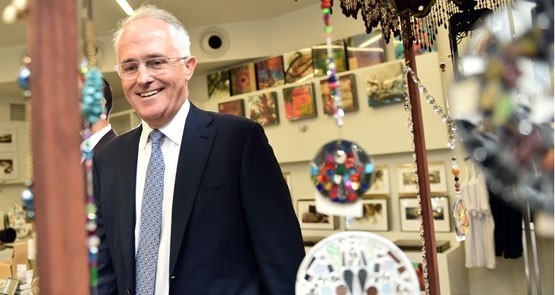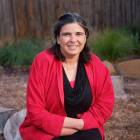
Malcolm Turnbull’s visit to the Islamic Museum of Australia and his meeting with the Islamic Council of Victoria (ICV) this week marked another stage in his campaign to reset the federal government’s relationship with Muslim communities after the low ebb reached during Tony Abbot’s prime ministership. The ICV withdrew from a meeting with Abbott in 2014, after Abbott’s comment about the need for migrants to join Team Australia proved to be just one dog-whistle too far.
Turnbull turned in a stellar performance of not being Tony Abbott during his meeting with the ICV, at least in terms of style and presentation. He acknowledged the pressures facing Muslims living in Australia, and expressed confidence that they stood in solidarity with other Australians against terrorism. The ICV’s press release described him has having adopted an “open, authentic and engaging response”, and thanked him for his respect. It’s a stark contrast with Abbott’s notorious speech on national security in which he said that he’d often heard Western leaders describe Islam as a religion of peace but that he wished that Muslim leaders would say it more often “and mean it”.
But although he looked every inch the not-Tony, he is yet to illustrate that he means it. The proposed new anti-terrorism legislation, which would expand the powers of the security agencies and lower the minimum age for control orders to 14, is still in the pipeline, George “right to be a bigot” Brandis is still serving as Attorney-General, and levels of fear among Muslims remain high. The death, reported yesterday, of the son of a prominent Melbourne Sheikh in Syria, as well as the inquest this week into the death of Numan Haider, illustrate how high the stakes are for all concerned.
Ayman Omran was the son of Jordanian-born Sheikh Mohammed Omran, the head of the Ahlus Sunnah Wal Jamaah (ASWJ) Association of Australia. A media release from ASWJ stated Ayman had “travelled as a volunteer to provide humanitarian aid, an act consistent with his soft heartedness and caring demeanour”. Sheikh Omran has been frequently described as a hardline extremist and he has been connected with a range of accused al-Qaeda figures. However, at a recent meeting at Sheikh Omran’s Hume Islamic Youth Centre, spokesmen corrected my use of “ISIS” to the derogatory label “Daesh”, and described it as a cult. The ASWJ press release about Ayman Omran’s death concluded with “ASWJ’s policy on travelling to the highly volatile, Syrian warzone remains unabated and the area is to be avoided”.
Haider was shot dead outside the Endeavour Hills police station in September 2014 after stabbing two police officers. The inquest will focus on the sequence of events leading to that evening, rather than on the shooting itself. His association with the (now closed) Al-Furqan bookshop, the confiscation of his passport application, his interaction with law enforcement agencies and his family’s awareness (or lack of awareness) of his drift into extremism will all come under scrutiny during the inquest, with implications for the lives of other alienated young Muslims and their families.
Abbott was warned by the security agencies that the breakdown of the relationship between his government and Muslim community organisations had serious implications for national security. Since his departure, there have been far fewer flashpoints, and those that have emerged, such at the shooting of Curtis Cheng by a 15-year-old Muslim youth, have been far more deftly handled. And yet, even without the introduction of more stringent legislation, the sense of hypervigilance and hypermonitoring has grown.
We do not (yet) live with the prospect of preventative detention or children subject to control orders, but Muslim communities have been warned that they must engage in self-surveillance, if they do not with to have it imposed upon them from outside. Community projects have been securitised to the point where a program run by the Australian Multicultural Foundation to teach computer skills to Muslim mothers was described as an initiative to help them fight Islamic State. Young Muslims much be watched wherever they go, online and off — and their families and community leaders must maintain constant vigilance.
In this climate, organisations such as Hizb ut-Tahrir, which warn that the government and courts are intervening in all aspects of Muslim life, are receiving a receptive hearing. The case last week of the freelance journalist who lodged an anti-discrimination case against Hizb ut-Tahrir for telling her to sit at the back of the room with the other women during one of their lectures has added to the sense that Muslim space is being monitored and regulated by outsiders.
Triumphantly reported by The Daily Telegraph and The Australian as a victory for feminists, this case is yet another example of women’s rights being hijacked for self-serving power trips. The journalist concerned revealed her own gendered assumptions when she says that she wanted to be “down the front, where the action was”. Having attended many Islamist events both in Australia and in Pakistan, I can tell Alison Bevege that the action is in the women’s section. She would have learnt far more by listening to them than by watching the PowerPoint slides that she “had to lean her neck to see” from the back of the room.
The photographs of Malcolm Turnbull flanked by smiling women in hijabs in Melbourne may end up looking like a false dawn if this climate of monitoring and discipline is maintained for any length of time. Of course, Muslim community leaders need to respond receptively to friendly overtures from government. But they cannot afford to be seen as government proxies, however warm the smiles and handshakes may be. And any progress that Turnbull may have made during his meetings this week will be undermined if there are no signs that he is acting on the concerns expressed to him.








People emigrate because, for reasons they deem adequate, they think they’ll have a better life … elsewhere than their motherland.
Whether it was the 19thC ‘huddled poor..” to the USA or post WWII Italians, Greek & ‘displaced persons'(shades of crisis du jour Syria), with few exceptions they acknowledged that the “old ways” were the problem.
To posit “the pressures facing Muslims living in Australia” is proof that the ‘old ways’ are not fit for purpose in the 21stC West.
Other immigrants shed their failed social systems, why can’t they?
Dear oh dear, I find myself agreeing with AR..
Interesting how we are regularly regaled with identity politics from Shakira, but Crikey never runs a spokesperson for the Buddists, Taoists, Roman Catholics, Anglicans, Jews, Christadelphians etc questioning its relationship with the Australian Govt.
Maybe its because none of those religious groups have members who threaten violence on the host population in the name of a supernatural deity.
Turnbull’s calmer approach is a relief for Aussie Muslims after the shouting from Abbott and his claque. Most Muslims in Australia just want to get on with life, get along well with the neighbours and keep well away from events in war zones. Shouty bigots using the Cowards’ Castle of Parliament to impugn our loyalty and question the very safety of having us in the country of our birth – about 40% of the Muslims in Australia were born here and many of us go back generations – distract us from getting on with life and put us under pressures that most other Australians don’t have to experience. Indigenous Australians excepted. Australia is my home and while I enjoy visiting neighbouring Muslim majority countries I’m always happy to get home to my own relatives, friends and colleagues. Turnbull’s more intelligent approach to his Muslim fellow countrymen enhances that feeling of being glad to come home.